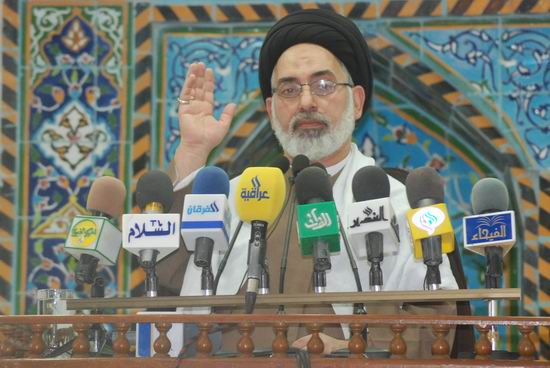
RNA – During his Friday prayer sermon delivered to a large and fervent crowd of believers in the Iraqi city of Najaf’s Fatimah al-Kubra Husayniyah, Hujjat al-Islam al-Qubanchi expressed satisfaction with the advancements and victories made by the Iraqi army and the Popular Mobilization Forces in fighting the terrorists in Ramadi.
“ISIL has been stricken with great failures and defeats,” he said.
His Eminence added that Iraq should not rely on foreign forces in the fight against ISIL, and stressed that the Iraqi government forces and Popular Mobilization Forces can defeat these terrorists.
Hujjat al-Islam al-Qubanchi considered the transfer of legal authority to the provinces as a legitimate right and described this issue as an efficient use of government resources and capabilities.
Najaf’s Friday prayers’ leader warned some Iraqi people against taking advantage and misusing peaceful protests against the lack of government and social services saying some people and groups are trying to exploit the protests to attack the Iraqi political system to show that Iraq is unstable. \
Najaf Friday prayers' leader answers Grand Imam of al-Azhar
In regard to a series of lectures about Imamate (Leadership) given by Shaykh Muhammad Ahmad al-Tayyib, the Grand Imam of Egypt’s renowned Sunni al-Azhar University, Hujjat al-Islam al-Qubanchi said that Grand Imam of al-Azhar claims that the Shi’ites have erroneously mixed the intellectual and political leadership together and added political leadership to their faith as an innovation.
The renowned professor in the Seminary of Najaf said that the Grand Imam of al-Azhar should study the texts and narrations of the Prophet Muhammad (S) on the political leadership of the Ahlul-Bayt (A).
He stressed that the Narration of “Manzilah” which states that the Prophet (S) addressed Imam Ali (A) and said, “To me, you are like Aaron to Moses, except for there is no prophet after me” shows that the caliphate of Imam Ali (A), who was the divinely appointed successor of the Prophet Muhammad (S), was both intellectual and political because the caliphate of Aaron, the divinely appointed successor of Moses, was also both intellectual and political.
The Iraqi scholar stressed that the Narration of al-Ghadir also acknowledges intellectual and political leadership and is proven by the presence of tens of thousands of Muslims who had gathered near the Pond of Khumm in the Hejazi desert and witnessed the Prophet’s (S) appointment of Ali ibn Abi Talib (A) as his heir and successor. All those present pledged their allegiance to the Imam.
111/112